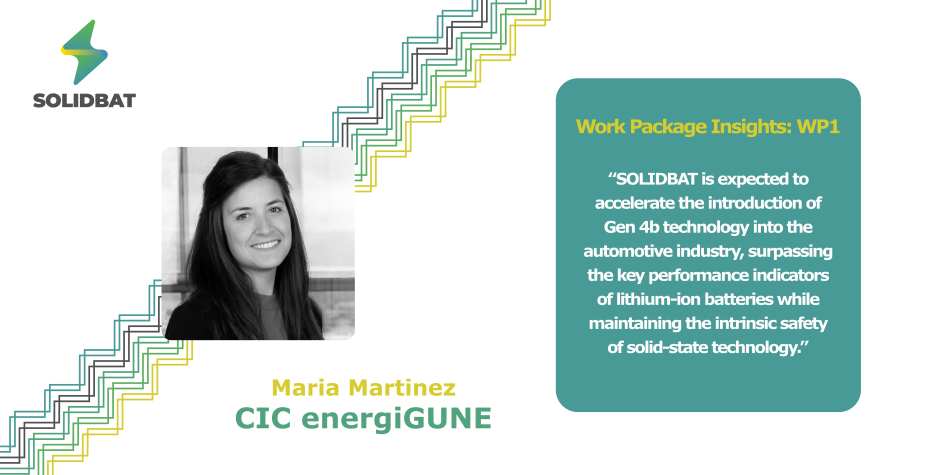Our work package leaders - Maria Martinez
The SOLIDBAT project is driving the development of next-generation solid-state batteries for electric vehicles. Under the coordination of María Martínez from CIC energiGUNE, WP1 focuses on ensuring the technology meets performance, safety, and sustainability targets while being compatible with large-scale production.


-
What does SOLIDBAT stand for?
SOLIDBAT stands for competitive and sustainable lithium SOLID-state battery technology enabling large-scale production for automotive application. Essentially, this project is focused on developing an innovative solid-state battery technology capable of meeting the performance and cost requirements of EVs in a safe and sustainable way, thereby increasing the adoption of this technology.
-
What advantages have SOLIDBAT battery compared to others in the market?
SOLIDBAT is expected to accelerate the introduction of Gen 4b technology into automotive industry, surpassing the key performance indicators of lithium-ion batteries while maintaining the intrinsic safety of solid-state technology. The SOLIDBAT technology aims to achieve a cost of 75 €/kWh at pack level (by 2030), while reaching 500 cycles at 80% depth of discharge, with an energy density above 400 Wh/kg and 1000 Wh/L by the end of the project. The SOLIDBAT battery innovation relies on the combination of a thin lithium metal anode with a highly conductive hybrid gel polymer electrolyte and a high-voltage cathode.
-
Compared to other solid-state battery technologies, which are main innovations?
In addition to the performance expectations that surpass those of current LIBs, SOLIDBAT will address one of the main challenges hindering the widespread acceptance of solid-state technology by cell manufacturers: the constraints in their production processes. In this regard, SOLIDBAT manufacturing will be adapted to current LIB technology, facilitating a rapid transition and industrialization of the developed technology.
Furthermore, the goal is to develop a battery technology that is not only efficient in performance but also environmentally friendly, based on components and manufacturing processes that meet the sustainability, safety, and recyclability requirements set by the EU. To achieve this, a complementary and experienced consortium covering the entire battery value chain has been assembled.
-
What does it mean for you to coordinate a European project?
For me, it is a pleasure and an exciting experience to be part of this consortium that brings together experts from both industry and academia in the field of materials and batteries. We are all aware of the challenges we will need to overcome to meet the project’s objectives, but this only makes the experience more rewarding and the outcome even more gratifying.
Beyond the technical aspects, SOLIDBAT is a special project because it is the first time I have conceived a proposal from zero together with my colleagues at CICe, designing the overall concept from scratch. Additionally, we have the support of other partners with whom we have already collaborated on a previous project with great success (SAFELiMOVE). In a way, we are creating an environment of trust that allows us to work more collaboratively and transparently, moving forward more quickly.